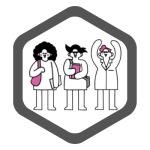Open Research in the Classroom
An initiative providing resources aiming to introduce open research and reproducibility concepts to high school and undergraduate students.
 Students from the University of Edinburgh have developed a set of educational resources aiming to introduce high school pupils and undergraduate students to open research practices and reproducibility.
Students from the University of Edinburgh have developed a set of educational resources aiming to introduce high school pupils and undergraduate students to open research practices and reproducibility.
It’s important that we, as researchers, are able to understand the impact of reproducibility and open research, and integrate best practices into our work. Many researchers have only started adopting these practices later on in their careers, but an early introduction to the concepts and benefits of open and reproducible research could greatly benefit the next generation of researchers.
Many pupils may participate in their first research project during the final years of their secondary education, as part of a course or a summer placement. Currently, most educational materials on the topics of open research and reproducibility expect their audiences to be active members of the research community, or have pre-existing knowledge of processes such as academic publishing.
A group of students from the University of Edinburgh recently launched a set of educational resources aiming to introduce high school pupils and undergraduate students to open research and reproducibility. The group comprised both postgraduate and undergraduate students, representing all three Colleges of the University of Edinburgh, and was led by Emma Wilson, a PhD student focusing on evidence synthesis and research improvement.
The “Open Research in the Classroom” resources include two short animation videos and a slide deck with accompanying instructor notes. The first animation and slide deck aim to introduce learners to the concepts of open research and reproducibility, which the second animation provides guidance on students conducting their first research project. The development of the resources was funded by a University of Edinburgh Student Experience Grant.
The resources can be accessed via the project website and the project OSF page, and are shared using Creative Commons by Attribution (CC-BY) licenses.
Headline Image Credit: Image from ‘Top Tips for Student Research Projects’, animated by Paupanimation

